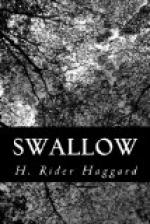“I am a soldier of Dingaan,” answered the man, “but when we were attacking the little people on that mountain I fell sick. Still I came away with the impi, but here my strength failed me, and here I have lain for a round of the sun and a round of the moon. I begged them to kill me, but my brothers would not, for they said that I might recover and join them.”
“Where have they gone?” asked Jan.
“They have gone to eat up the Boers in Natal,” the Zulu answered in a hollow voice, his empty eyes wandering towards the mountains of the Quathlamba range. “Yes, they have gone to do the King’s bidding on the white men, for his word came to us while we besieged yonder stronghold. To-morrow at the dawn they attack the little laager beneath the white koppie by the banks of the Tugela, and I must reach them by then—yes, yes, now I am strong again, and I shall attack with them to-morrow at the dawn. Farewell, white men, I will not kill you because you gave me the water which has made me strong again,” and, rising from the ground, he grasped his spear and started forward at a run.
“Stay,” cried Ralph. “I would question you as to what has happened on that mountain;” but the man did not seem to hear him. For thirty paces or so he ran on, then suddenly he halted and saluted with his spear, crying in a loud voice:
“Chief, I report myself, I am present.”
Next he stretched his arms wide and fell forward upon his face. When they reached him he was quite dead.
“This is a strange story that we have heard about the Zulus and the folk in Natal,” said Jan, rubbing his forehead.
“I think that the man was wandering in his mind,” answered Ralph, “still there may be truth in it; but, father,” he added, with a gasp of fear, and, catching Jan by the arm, “what has happened on the mountain Umpondwana? The Zulus have been there, and—what has happened on the mountain?”
Jan shook his head, but did not answer, for he knew too well what happens where the Zulu impis pass.
Notwithstanding that Ralph was mad with impatience we halted the waggon for a few minutes to take counsel, and in the end decided to send the voorlooper back to the camp which we had left to warn our friends of what we had learned as to the onslaught on our brethren in Natal, though we had small faith in the story. But either the lad ran away, or some accident befell him, or he failed to find the Boers who had already trekked, at the least our message never reached them, nor did we see him again. Then we went on, Gaasha leading the oxen as quickly as they could walk. All that afternoon we travelled almost in silence, following the spoor of the impi backwards, for our hearts were full of fear. We met no man, but once or twice we saw groups of cattle wandering unherded, and this astonished us, giving us hope, for it was not the custom of a victorious impi to leave the cattle of its enemy behind it, though if the people of the Umpondwana had conquered, it was strange that we should see no herds with the beasts.




